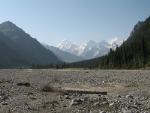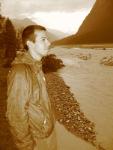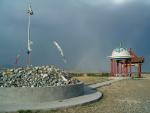- Getting around Lijiang. Dont stay in the Old Towns more than 2 days, there is nothing to do. KRISS Oct 9, 2013 05:46
- 2013 Beijing Temple Fair BENNYLAU Feb 26, 2013 03:29
- Malaysian traveling from KUL - LAX vis Shanghai PVG ZATI_DY Jan 3, 2013 20:15
<a>Xinjiang Spy Games: Trouble on the Border
- Views: 4198
- |Vote: 0 0
- |Add to Favorites
- |Recommend to Friends
A Remote Rendezvous
I’ve always loved the outdoors, so when I heard about Xinjiang’s vast plains and snowy peaks, I wanted to see as much of the province as I could. But I never knew my desire to travel could get me into so much trouble.
I spent less than 24 hours in Urumqi before boarding a plane to Yi Ning (a city also called Gulja or Ili interchangeably). A contact in the capital city had given me the name and telephone number of a Mongol who he said would be a great travel guide. Matt (this guy’s English name) had just graduated with a degree in English from a university in Inner Mongolia, and he had a place for us to stay in his little village, a few hours southwest of Ili, only a few kilometers away from the Kazakhstan border. The only catch was that we had to get to him.
The plan was to call Matt when we reached Zhaosu, one of most westerly cities in China. From there, Matt would arrange for a friend to pick us up in his mianbaoche (small van) and take us the rest of the way to White Water, a small, off-the-map town in the foothills of the Tian Shan mountains.
When we got to Zhaosu, we bought some Uyghur-made nan bread, beef, and a watermelon to give to our host and his family. We had no one out here but them, and their hospitality would be essential to the success of our journey.
I pulled out my small cell phone and dialed Matt’s number, hoping he’d quickly arrange a rendezvous point so we wouldn’t be carrying all this food around for too long.
“Hello?” he said.
“Hello, Matt,” I said. “This is Trevor. We are in Zhaosu, waiting to meet with your friend.”
“You, waiting for me 20 minutes,” he stammered. “I call you back.”
I was in no position to argue, so I put the phone back in my pocket and relayed the news to my companions, Brad and Zach.
Before I could finish speaking, a dark-skinned man ran up to us and began speaking English. Surprised to see Americans in his hometown, Karat was a Kazakh who had studied English from an American teacher at Xinjiang University in Urumqi. As was his summer tradition, Karat had come home to teach a month of English to middle school students, and he wanted us to help him with today’s class.
We had nothing else to do but wait, so we followed him upstairs and into his classroom. Students began to file in, surprised to see three white guys waiting for them.
They asked us to teach them slang, so we created a dialogue with terms like “Hey, what’s up?” and “Peace out.” Just as I was explaining to them how to play football, my phone rang again. Matt’s uncle was ready to meet us at the bus station.
Hot Water
We could see 14,000-foot peaks from the barred windows of Matt’s concrete and adobe house. The day after our arrival, he took us hiking in foothills past the rushing white river that gave the city its name. During our time in White Water, we met Kazakhs living in mountain meadows and played basketball with the Mongolian leaders of the city.
The next day, Matt decided to take us to a new destination, a venue he claimed was even more scenic than the view from his garden. “Hot Spring,” as he called it, was a secluded hot springs resort nestled in a mountain valley just a few miles upstream from some of the tallest mountains in the region. The only way to get there was by four-wheel-drive, so we hired a Uyghur driver who steered us around perilous mountain curves. We held our breath as we snaked around the sides of the valley, praying that our descent would be gradual decline instead of a sudden fall. There were no guardrails here, and the pointy evergreens below did little to ease our minds.
“Hot Spring” lived up to its billing. The Han Chinese owner set us up in a small yurt on the side of the resort closest to the river. The hot springs were divided into small stalls, and we visited them at night so we wouldn’t have to think about how dirty they were. The highlight of the trip was the scenery, but we didn’t have the time or the equipment to venture into the tantalizing mountains. To ease the strain on our wallets, we only stayed one night before following the winding road back to White Water.
The Cola Quest and a Sticky Situation
We used the next day to rest and catch up on our journaling. Matt had gone back to Zhaosu to take an English proficiency test as a prerequisite for a teaching job. We were all alone, and we spent most of the day lounging on the wool-covered plywood platform in the family’s sleeping quarters. About 4 p.m., I got bored and decided we should walk into town to get some cold Coca-Colas. The guys agreed, so we began our quest.
In this remote area, electricity is limited and therefore strictly regulated. Store owners are allowed to run their freezers at night, but they must rely on the insulation in the coolers to keep drinks and cold foods cool throughout the day. Also, because this town is so far west, the limited variety of colas (mostly Pepsi and a knock-off called Future Cola) that make it here have passed their expiration date. So our chances of finding a fresh, ice-cold Coke were severely limited.
As we wandered from shop to shop, we became amused that a simple idea had become such a complicated mission. Just then, a man in a green uniform came up to talk to us.
“Where is your guide?” he asked, apparently ticked off that we were searching for a Coke.
“In Zhaosu,” I replied, wondering why he seemed so annoyed.
“Does he have a phone?”
I said yes as I handed him the phone with Matt’s number pulled up on the screen. He pressed the send button and engaged in a brief conversation with Matt. After hanging up, he said that Matt had to register us with the local police when he returned in the afternoon.
Matt met us back at the house around 5:30, and we walked nonchalantly to the police station. We’d registered in another town without incident, and we expected no trouble here.
A chubby Kazakh officer hustled inside as we approached the building. He looked disturbed, as if he couldn’t understand why Americans would want to stay in his city. He took our passports and recorded the numbers. Then we conversed back and forth for about 30 minutes before the he handed down his verdict: Since there are no hotels in White Water approved for foreigners, we’d have to be transported back to Zhaosu.
Fortunately they let us return to Matt’s house to eat the meal his mother had prepared for us. Then we were loaded into a van and sent back to Zhaosu in an deportation that became the first in a series of chain overreactions.
The driver took us straight to the Zhaosu police department, where after half an hour of deliberation, the officers decided to let us spend the night. But we couldn’t get too comfortable, because they wanted us on a bus to Ili in the morning. While we were sad that we’d have to leave our new friend two days earlier than we planned, we were relieved because the running around was finally over.
Settled in our new hotel room, we discussed plans for the rest of our trip and prepared to get some sleep. As we went to turn out the lights, we heard a light rap on the door.
“Williams?” A small woman motioned for me to follow her downstairs into the lobby, where two officers sat waiting.
One was unmistakably Uyghur. His hair was slicked back, his sly eyes and lit cigarette giving him the look of a more exotic Al Pacino. His jacket was more decorated than that of the other guy, a tall and well-built Mongol that looked like he was in his late 20s. It was a little ironic that both of them, minority people, worked for the Chinese police force.
The Mongol motioned for me to sit in a dark wooden chair. He asked me if I spoke Chinese. I told him that I did, a little. That seemed to him ample motivation to launch into a complex diatribe. I understood very little, and my face must have shown it. After further explanation, I figured out that there was a problem with my visa registration. When they were done questioning me, they said their goodbyes. I thought they said something about coming back for more interrogation, but I was not sure.
Back up in the room, I crawled into bed for the night, hoping that I heard wrong, that they weren’t coming back. But as I slipped toward sleep, we heard another knock, this one louder than the first. This time the officers didn’t waste any time. They came all the way to my room.
I followed them back downstairs into the lobby, and we engaged in what seemed like the exact same dialogue. I still couldn’t understand most of what they were saying. When they finally released me, they asked that I leave my passport at the front desk. In the morning, I could come pick up my passport, and they’d be back with an interpreter to ask more questions.
Russian Spies?
Matt came back around 6:30 the next morning. He apologized again for all the trouble we’d had the night before. We told him that it was no problem, but that he should know the police had come again after he’d left. At this his eyes got large and his face was gripped by nervous fear. We assured him that everything was fine, but it didn’t seem to calm him down.
Zach and Matt began talking as Brad and I shook the grogginess from our heads.
Knock-knock-knock!
It was 7 a.m., and they were already back. Matt’s high Mongolian cheekbones got a little higher as he raised his eyebrows in fear.
I opened the door with a smile and a nod, trying to seem polite, confident, and ignorant all at the same time. Only one of them was in uniform, and they didn’t seem ready for official business. Speaking through Matt, they said they’d give us time to freshen up and would return for a two-hour interrogation after breakfast.
I was more annoyed than afraid. I had nothing to hide, and this back-and-forth was starting to get under my skin. If they wanted us to leave, I thought, they should just let us go.
The officers returned ready for action. Pacino had donned a tie and his decorated navy blue police jacket. The Mongol was neat as usual. Neither of them carried a gun.
After copying down our passport information, the interrogation began. They used Matt as long as they could and then called for an impartial and more adept translator to join the fray. He was one of the nicest guys I’ve ever met, and his politeness diffused much of the tension in the room. It also helped that he spoke decent English, and we were not completely in the dark anymore.
The officers asked some vague questions about our activity in the region, and then narrowed their focus to our personal backgrounds. They asked all of us if we could speak Russian, and they asked Zach, who’s in great physical shape, if he currently served in the U.S. army. Luckily Zach, a former Army Ranger, could truthfully say no. If we’d answered yes to any of the above questions, I have a feeling we’d have entered another level of interrogation that wouldn’t have been so friendly.
Their fears of Russian spy activity assuaged, the officers suddenly began treating us like old friends. They asked about our schooling, families and jobs back in the U.S. We gave them key-chains that featured a Georgia map and a star representing Atlanta. They ushered us to the bus station, and we left on good terms.
But that was not the last we’d see of police. With our plans shot, we decided to do some city-hopping around northwest Xinjiang. We had harmless but consistent interrogations in five more cities before we made it back to Urumqi for our flight home. We'd learned the hard way that Xinjiang is a sensitive political region, and if you want to experience its natural beauty, you'll have to put up with some human inconveniences.







 Copyright © 1998-2026 All rights reserved.
Copyright © 1998-2026 All rights reserved.